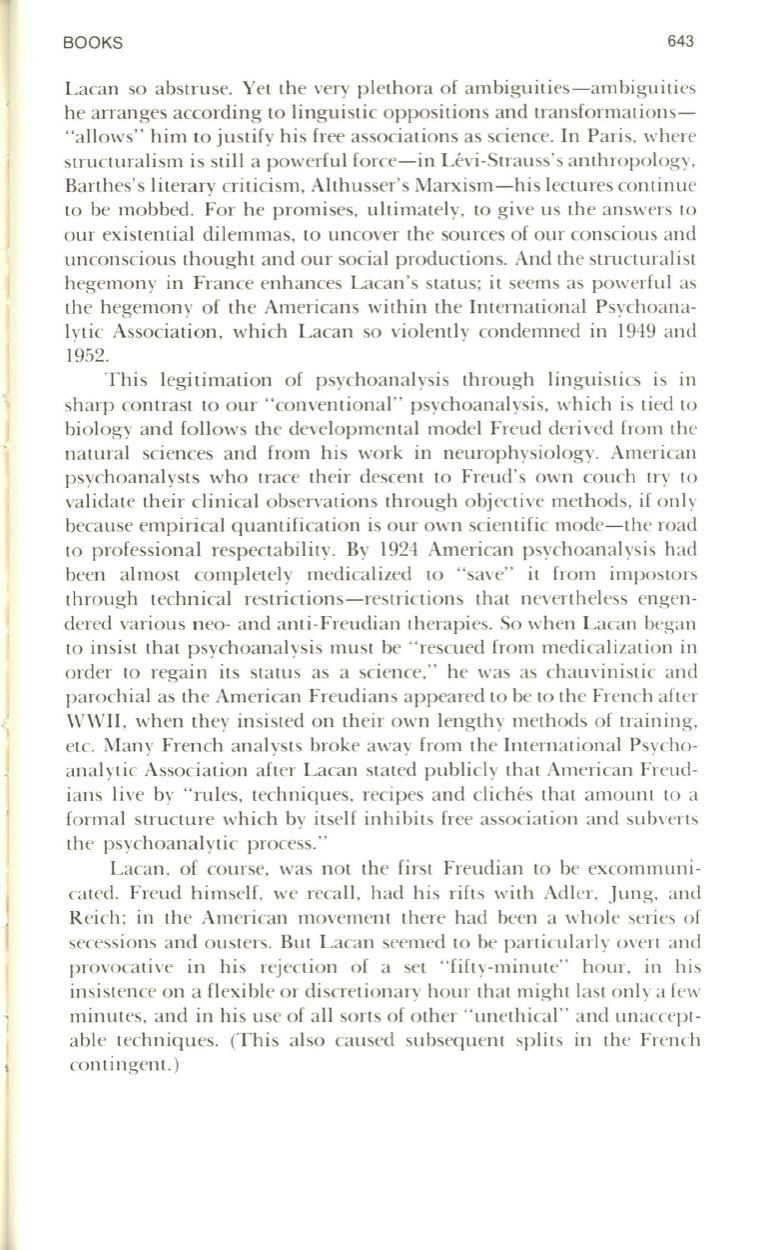
BOOKS
643
Lacan so abstruse. Yet the very p lethora of ambigu iti es - am biguities
he arranges according
to
lingui sti c oppositi on s and transfo rmat ions–
"all ows" him to justify hi s free associa ti ons as science. In Par is, where
struct ura lism is still a powerful force-in Lev i-Stra uss's an th ropology,
Barth es's litera ry criti cism , Althusser's Marxi sm-h is lectures con tin ue
to be mo bbed. Fo r he promi ses, ultima tely, to g ive us th e answers to
our exi stentia l dil emmas,
to
uncover th e sources o f ou r conscio us and
unconscious tho ught and our soc ia l p roduction s. And the structura li st
hegemo ny in France enh ances Laca n 's sta tu s; it seems as powerfu l as
the hegemon y of th e Ameri cans within the Interna ti onal Psychoana–
lyti c Associa ti o n , whi ch Lacan so violentl y condemned in 1949 and
1952.
T hi s legitima ti on o f psychoana lys is th rough lingu isti cs is ill
sha rp contras t to o ur "conventi ona l" psychoana lys is, whi ch is ti ed to
bi o logy and fo ll ows th e developmenta l model Freud der ived from the
na tu ra l sciences and from hi s wo rk in neurophys io logy. Amer ican
psychoanalysts who trace their descent to Freud 's own couch try to
va lida te th eir clinica l observa tions thro ugh o bj ecti ve meth ods, if o nl y
because empirical quantifi ca ti o n is our own scientifi c mode-the road
to profess ion a l respecta bility. By 1924 Ameri can psychoana lys is had
been almos t compl etely medi ca li zed to "save" it from impostors
through techni cal res tri cti on s-res tri ctions tha t neverth eless engen–
dered va ri ous neo- and anti-Freudi an therapies. So wh en Lacan bega ll
to insist th at psychoana lys is must be " rescued from medi cali za ti on in
o rder to rega in its sta tu s as a sc ience, " he was as chauvini sti c and
parochi a l as th e Ameri can Freud ian s appea red to be
to
th e French af ter
WWII , wh en th ey in sisted on their own leng th y methods of tra ining ,
etc. Many Fren ch ana lys ts bro ke away from the Intern a ti o nal Psycho–
ana lyti c Associa ti on a fter Lacan sta ted publicl y th a t Ameri can Freud–
ian s live by " rul es, techniques, recipes and cli ches tha t amo unt
to
a
fo rma l structure whi ch by itself inhibits free assoc ia ti on and subverts
th e psychoana lyti c process."
Laca n , of cou rse, was no t the first Freudi an
to
be excommun i–
ca ted . Freud himself, we reca ll , had hi s rifts with Adl er , lung, and
Reich ; in th e Ameri can movement there had been a who le seri es of
secess ions and ousters. But Laca n seemed
to
be parti cul ar ly ove rt and
provoca ti ve in hi s rejecti on o f a set " fift y-minute" ho ur , in hi s
in sistence on a fl exible o r di screti on ary hour th a t mi ght las t onl y a
few
minutes, and in hi s use of a ll so rt s of o ther " un ethi cal" a nd un accep t–
abl e techniques. (Thi s a lso ca used subsequ ent splits in th e French
contingenl. )


